人教版七年级下册期末复习U1-U2课件(共36张PPT)
文档属性
| 名称 | 人教版七年级下册期末复习U1-U2课件(共36张PPT) |

|
|
| 格式 | pptx | ||
| 文件大小 | 12.8MB | ||
| 资源类型 | 教案 | ||
| 版本资源 | 人教新目标(Go for it)版 | ||
| 科目 | 英语 | ||
| 更新时间 | 2024-06-07 00:00:00 | ||
图片预览

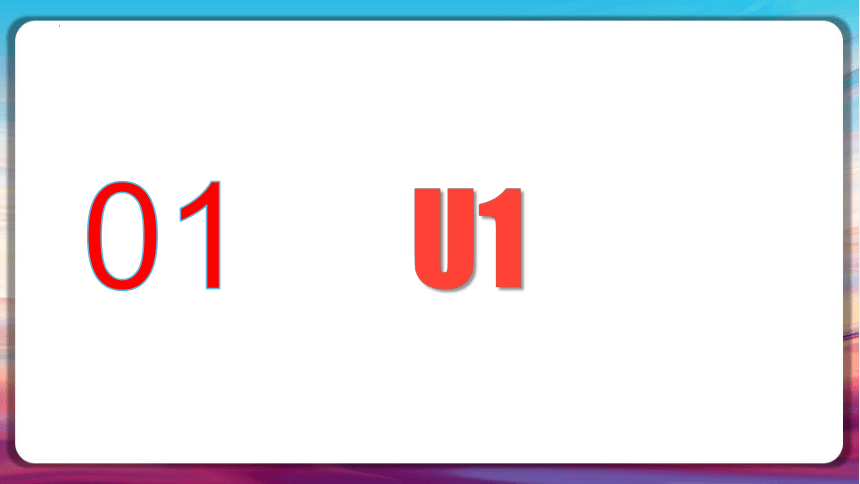
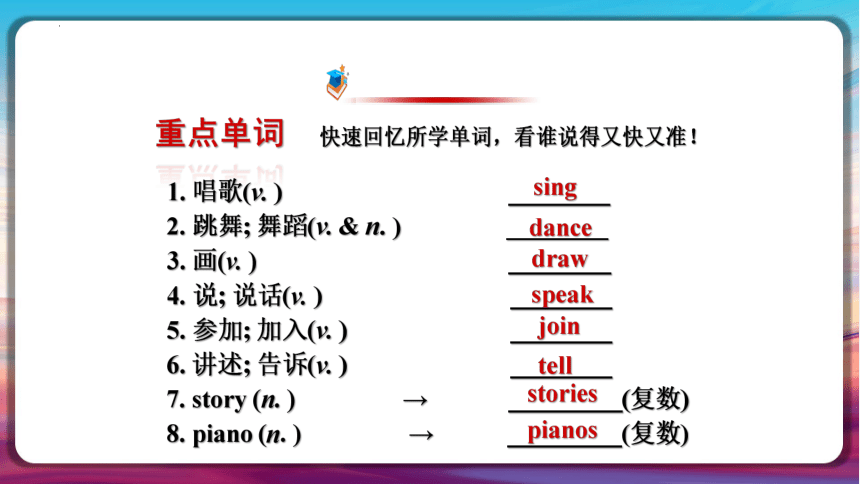
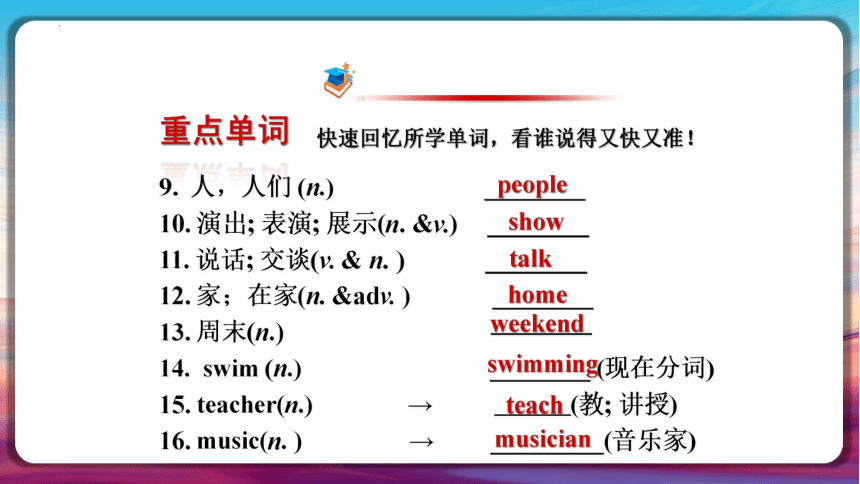
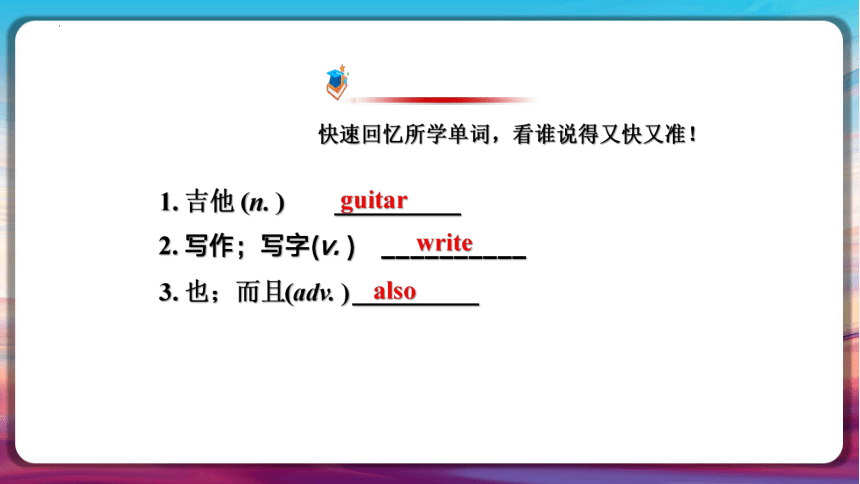
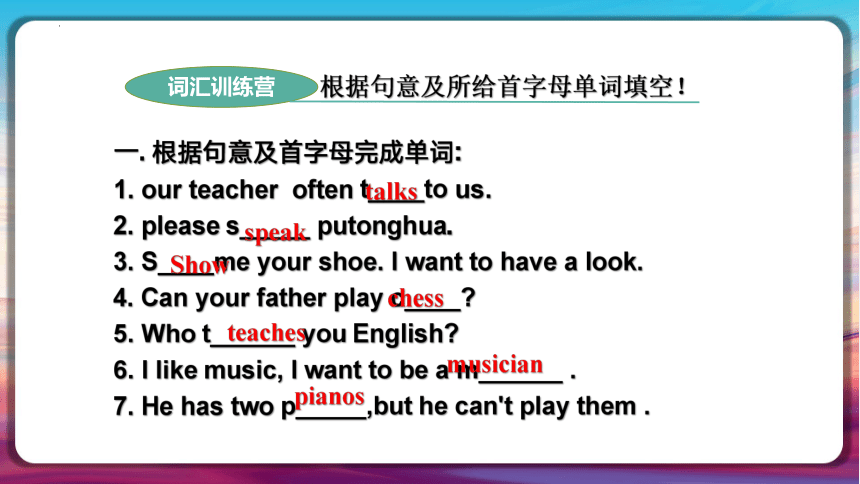
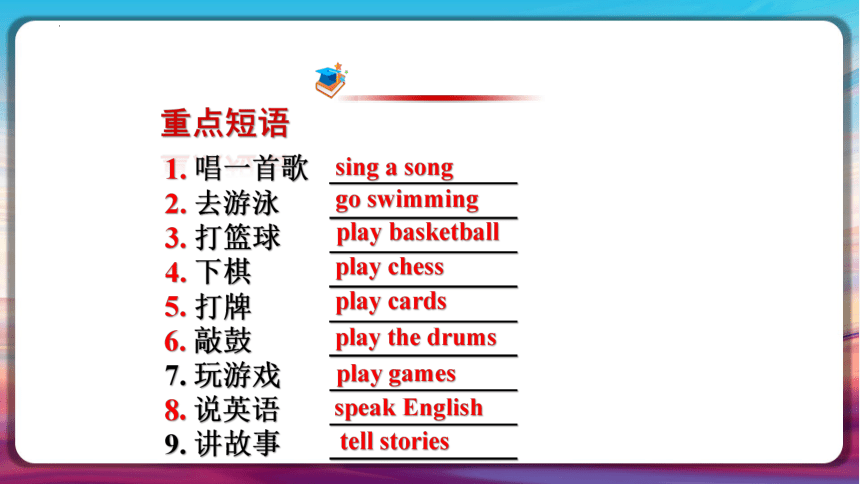
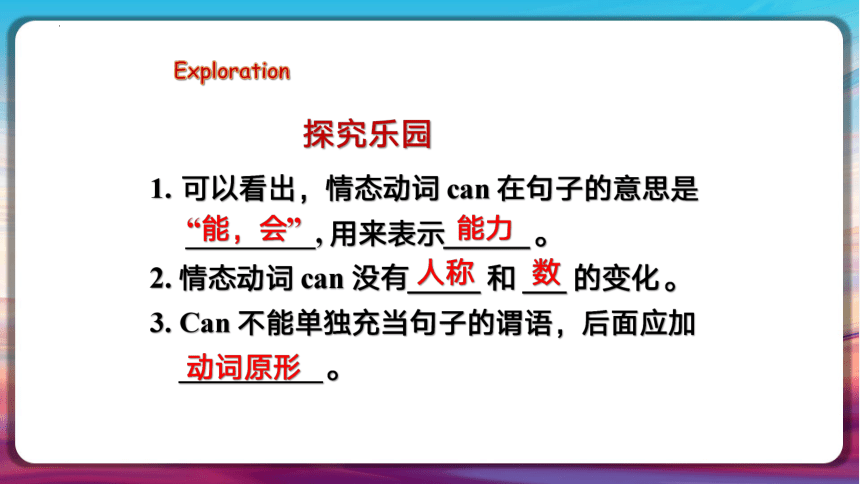
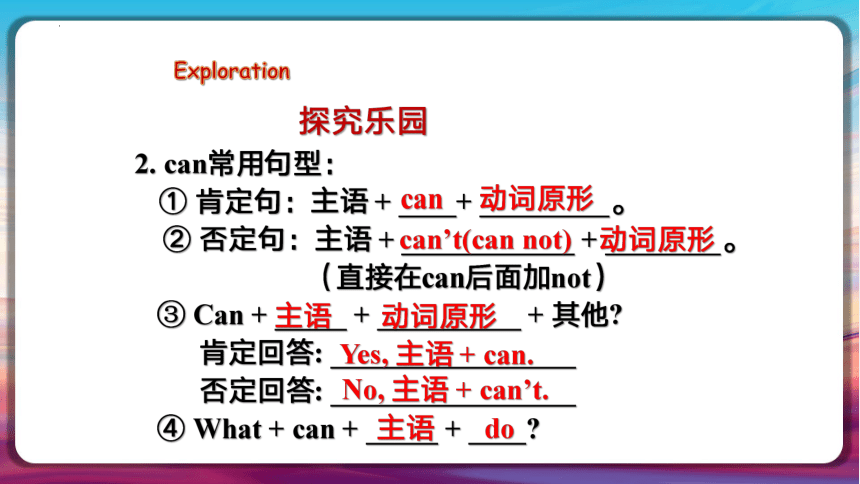
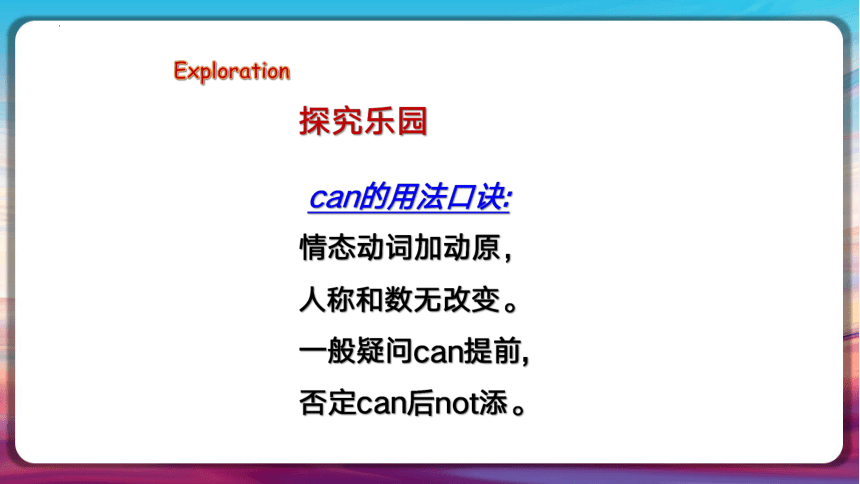
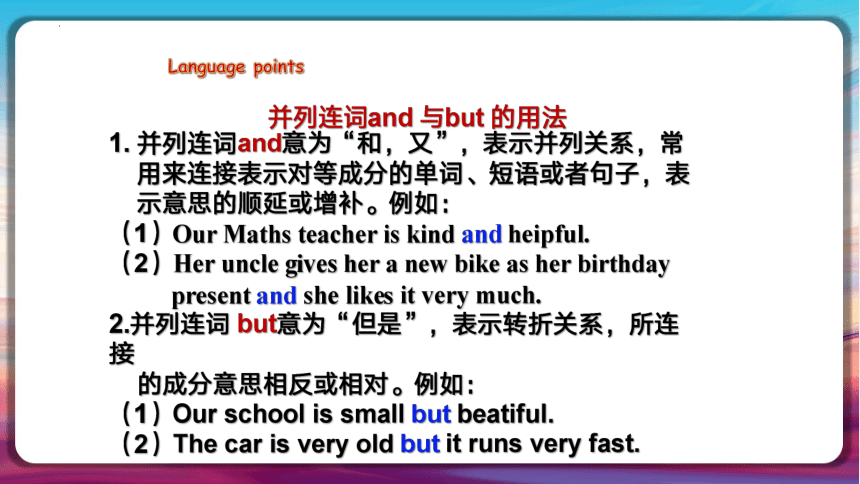
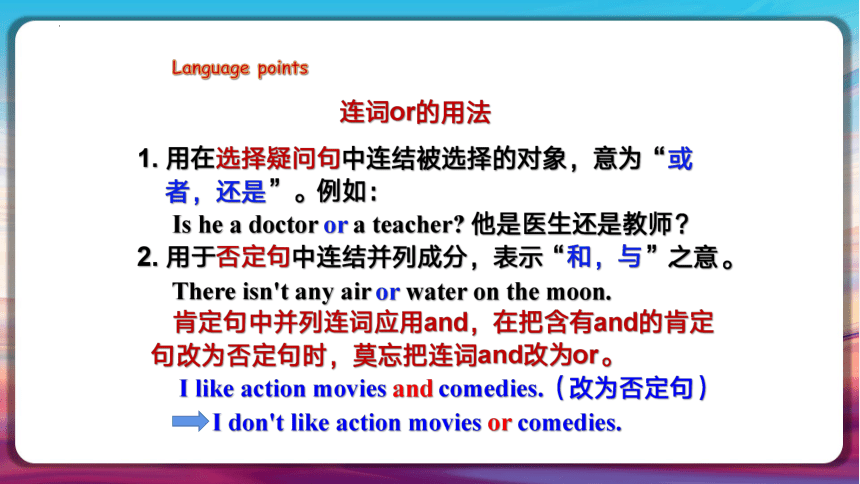
文档简介
(共36张PPT)
2024人教版七下
期末复习
U1-U2
U1
01
重点单词
1. 唱歌(v. ) ________
2. 跳舞; 舞蹈(v. & n. ) ________
3. 画(v. ) ________
4. 说; 说话(v. ) ________
5. 参加; 加入(v. ) ________
6. 讲述; 告诉(v. ) ________
7. story (n. ) → _________(复数)
8. piano (n. ) → _________(复数)
sing
dance
draw
speak
join
tell
stories
pianos
快速回忆所学单词,看谁说得又快又准!
9. 人,人们 (n.) ________
10. 演出; 表演; 展示(n. &v.) ________
11. 说话; 交谈(v. & n. ) ________
12. 家;在家(n. &adv. ) ________
13. 周末(n.) ————
14. swim (n.) ________ (现在分词)
15. teacher(n.) → (教; 讲授)
16. music(n. ) → _________(音乐家)
重点单词
show
talk
teach
musician
people
home
weekend
swimming
快速回忆所学单词,看谁说得又快又准!
1. 吉他 (n. ) __________
2. 写作;写字(v. ) __________
3. 也;而且(adv. ) __________
快速回忆所学单词,看谁说得又快又准!
guitar
write
also
一. 根据句意及首字母完成单词:
1. our teacher often t____to us.
2. please s_____ putonghua.
3. S____me your shoe. I want to have a look.
4. Can your father play c____
5. Who t______ you English
6. I like music, I want to be a m______ .
7. He has two p_____,but he can't play them .
talks
speak
Show
chess
teaches
musician
pianos
词汇训练营
根据句意及所给首字母单词填空!
1. 唱一首歌 _____________
2. 去游泳 _____________
3. 打篮球 _____________
4. 下棋 _____________
5. 打牌 _____________
6. 敲鼓 _____________
7. 玩游戏 _____________
8. 说英语 _____________
9. 讲故事 _____________
sing a song
go swimming
play basketball
play chess
play cards
play the drums
speak English
play games
重点短语
tell stories
可以看出,情态 动词 can 在句子的意思是
_________, 用来表示______。
2. 情态 动词 can 没有_____ 和 ___ 的变化。
3. Can 不能单独充当句子的谓语,后面应加
__________。
探究乐园
人称
数
动词原形
“能,会”
能力
Exploration
探究乐园
Exploration
2. can常用句型:
① 肯定句:主语 + ____+ _________。
② 否定句:主语 + ____________ + ________。
(直接在can后面加not)
③ Can + _____ + __________ + 其他
肯定回答: _________________
否定回答: _________________
④ What + can + _____ + ____
主语 动词原形
主语 do
Yes, 主语 + can.
No, 主语 + can’t.
can 动词原形
can’t(can not) 动词原形
探究乐园
can的用法口诀:
情态动词加动原,
人称和数无改变。
一般疑问can提前,
否定can后not添。
Exploration
1. 并列连词and意为“和,又”,表示并列关系,常
用来连接表示对等成分的单词、短语或者句子,表
示意思的顺延或增补。例如:
(1)Our Maths teacher is kind and heipful.
(2)Her uncle gives her a new bike as her birthday
present and she likes it very much.
2.并列连词 but意为“但是”,表示转折关系,所连接
的成分意思相反或相对。例如:
(1)Our school is small but beatiful.
(2)The car is very old but it runs very fast.
并列连词and 与but 的用法
Language points
1. 用在选择疑问句中连结被选择的对象,意为“或
者,还是”。例如:
Is he a doctor or a teacher 他是医生还是教师?
2. 用于否定句中连结并列成分,表示“和,与”之意。
There isn't any air or water on the moon.
肯定句中并列连词应用and,在把含有and的肯定
句改为否定句时,莫忘把连词and改为or。
I like action movies and comedies.(改为否定句)
I don't like action movies or comedies.
Language points
连词or的用法
⑴ 名词 “ 演出;表演;节目 ”,eg:
clothes show 时装表演
talk show 脱口秀
school show 校园演出
talent show 才艺表演
We want students for the school show.
我们需要学生参加我们的校园演出。
知识点
1
show的用法:
language points
⑵ 动词 “给……看;展示”
① show sb. “给某人展示(表演)一下”
Come and show us.
来给我们(表演)看一下。
② show sb. sth.= show sth. to sb.
(给某人看某物)
Can you show me your new iPad
你能让我看一下你的新的平板电脑吗?
知识点
show的用法:
language points
U2
02
dress
get dressed
up
get up
brush
tooth(teeth)
shower
take a shower
usually
v./n. 穿衣服;连衣裙
穿上衣服
adv. 向上
起床
v./n. 刷;刷子
n. 牙齿
n. 淋浴;淋浴器
淋浴;洗澡
adv. 通常
New words
Let's read together!
never
early
fifty
job
work
station
radio station
night
funny
adv. 从不,绝不
adv.&adj. 早(的)
num. 五十
n. 工作,职业
v.&n. 工作
n. 电视台,车站
广播电台
n. 晚上,夜晚
adj. 奇怪的,滑稽的
New words
Let's read together!
on weekends
best
group
在周末
adj. 最好的
adv. 最好地
n. 组,群
New words
Let's read together!
revision
肯定句:
I can sing.
一般疑问句:
Can you sing
肯定回答:
Yes, I can.
否定回答:
No, I can’t.
Look and say
sing
vt. 唱;唱歌
肯定句:
一般疑问句:
肯定回答:
否定回答:
revision
She can swim.
Can she swim
Yes, she can.
No, she can’t.
Look and say
swim
vi. 游泳
肯定句:
一般疑问句:
肯定回答:
否定回答:
revision
They can dance.
Can they dance
Yes, they can.
No, they can’t.
Look and say
dance
vi. 跳舞
1. job与work 辨析
job是可数名词, 主要指有报酬的工作
work是不可数名词, 主要指要付出努力 的劳动
鲍勃想找一份好的工作。
Bob wants to find a good ____.
今天我有很多工作要做。
I have much _____ to do today.
她每天六点钟去上班。
She goes to _____ at six o’clock.
job
Language points
work
work
2. That’s a funny time for breakfast!
time常常和介词“for”搭配,表示“做…的时间”。如:
We don’t have too much time for sports.
我们没有太多的时间开展体育活动。
Time for dinner, children. Go and wash your hands, please.
孩子们,饭好了。去洗手吧。
Language points
What's the time
1. It’s ________________.
It’s time for breakfast.
seven o’clock a.m.
2. It’s _____________. It’s
time for fun and exercises.
ten thirty a.m.
3. It’s ______________. It’s time for afternoon sleep.
two thirty p.m.
4. It’s _________________.
It’s time for dinner.
seven o’clock p.m.
3. exercise 的用法小结
作动词,意为“锻炼”。如:
他爷爷每天早晨锻炼。
His grandpa _________ in the morning.
作不可数名词,意为“锻炼;运动”,如:
每天他都做大约十五分钟的运动。
He does about fifteen minutes’ ________ every day.
作可数名词,意为“体操, 练习”。
我们每天做早/眼操。
We do morning /eye ________ every day.
exercises
exercise
exercises
Language points
频率副词
always 意为 “总是”, 表示动作的重复或状态的延续。
usually 意为 “通常”, 表示很少有例外。
sometimes 意为 “有时”, 表示动作偶尔发生。
never 意为 “从未”。
重点
提示:频率副词在句中的位置是:实义动词之前, be动词、助动词、情态动词之后。
I _______ (通常) get dressed at six forty.
Jack is _______ (总是) late.
His grandpa _______ (从未) goes to school.
usually
always
never
language points
100%
always
usually
sometimes
≥ 80%
never
0%
≥ 20%
总是
通常
有时
从不
频度副词是用来表示动作的频率,但程度有所不同。
language points
— 你通常什么时候起床?
_________________________________
— 我通常六点半起床。
_____________________________
2. — 他们通常什么时候穿衣服?
______________________ ___________
— 他们总是在七点二十分穿衣服。
____________________________________
完成下列句子。
I usually get up at six thirty.
What time do you usually get up
What time do they get dressed
They always get dressed at seven twenty.
Examination
3. — 瑞克什么时候吃早饭?
________________________________
— 他在七点钟吃早饭。
________________________________
— 斯科特什么时候去上班?
_______________________________
— 他总是在十一点去上班,他从不迟到。
______________________________________
_______________________
He eats breakfast at seven o’clock.
What time does Rick eat breakfast
When does Scott go to work
Examination
He always goes to work at eleven o’clock.
He’s never late.
— 你的朋友们什么时候锻炼?
_________________________________
— 他们通常在周末锻炼。
__________________________________
When do your friends exercise
They usually exercise on weekends.
1. 洗澡
2. 去上班
3. 穿上衣服
4. 起床
5. 吃晚饭
6. go to school
7. go to bed
8. (在)周末
9. exercise
10. 在校期间
take a shower
go to work
get dressed
get up
eat dinner
上学
上床睡觉
on weekends
锻炼;练习
on school days
I. 英汉互译。
Exercises
Ⅰ. 单项选择
1. They want singers ____ their school show.
A. for B. in C. on D. of
2. Can I talk ____ you after class
A. for B. and C. or D. to
3. — Can you speak English ____ Chinese
— Chinese.
A. and B. or C. but D. to
A
D
B
Exercises
4. My grandpa likes to us funny stories.
A. say B. tell C. talk D. speak
5. —What can you do — .
A. He can sing B. I like apples
C. I can’t sing D. I can play chess
6. Kathy can play____ guitar well, but Lisa can play
____ soccer well.
A. a; a B. the; the C. the; / D. /; the
B
D
C
Exercises
7. —Do you like Jay Chou Jackie Chan
—Jay Chou. He sings very well.
A. and B. or C. but D. with
8. We want two boys our school art club.
A. in B. to C. for D. on
9. —I can speak Chinese. What about you
—I can speak it.
A. too B. also C. well D. good
B
C
B
Exercises
10. My father often helps me English.
A. to studying B. study C. studied D. studying
11. Teachers wanted! Please call Mr. Lee 435-7688.
A. at B. in C. for D. with
12. Grace is good soccer.
A. in B. at C. with D. for
13. She teaches English.
A. I B. my C. me D. mine
B
A
B
C
Exercises
thanks
2024人教版七下
期末复习
U1-U2
U1
01
重点单词
1. 唱歌(v. ) ________
2. 跳舞; 舞蹈(v. & n. ) ________
3. 画(v. ) ________
4. 说; 说话(v. ) ________
5. 参加; 加入(v. ) ________
6. 讲述; 告诉(v. ) ________
7. story (n. ) → _________(复数)
8. piano (n. ) → _________(复数)
sing
dance
draw
speak
join
tell
stories
pianos
快速回忆所学单词,看谁说得又快又准!
9. 人,人们 (n.) ________
10. 演出; 表演; 展示(n. &v.) ________
11. 说话; 交谈(v. & n. ) ________
12. 家;在家(n. &adv. ) ________
13. 周末(n.) ————
14. swim (n.) ________ (现在分词)
15. teacher(n.) → (教; 讲授)
16. music(n. ) → _________(音乐家)
重点单词
show
talk
teach
musician
people
home
weekend
swimming
快速回忆所学单词,看谁说得又快又准!
1. 吉他 (n. ) __________
2. 写作;写字(v. ) __________
3. 也;而且(adv. ) __________
快速回忆所学单词,看谁说得又快又准!
guitar
write
also
一. 根据句意及首字母完成单词:
1. our teacher often t____to us.
2. please s_____ putonghua.
3. S____me your shoe. I want to have a look.
4. Can your father play c____
5. Who t______ you English
6. I like music, I want to be a m______ .
7. He has two p_____,but he can't play them .
talks
speak
Show
chess
teaches
musician
pianos
词汇训练营
根据句意及所给首字母单词填空!
1. 唱一首歌 _____________
2. 去游泳 _____________
3. 打篮球 _____________
4. 下棋 _____________
5. 打牌 _____________
6. 敲鼓 _____________
7. 玩游戏 _____________
8. 说英语 _____________
9. 讲故事 _____________
sing a song
go swimming
play basketball
play chess
play cards
play the drums
speak English
play games
重点短语
tell stories
可以看出,情态 动词 can 在句子的意思是
_________, 用来表示______。
2. 情态 动词 can 没有_____ 和 ___ 的变化。
3. Can 不能单独充当句子的谓语,后面应加
__________。
探究乐园
人称
数
动词原形
“能,会”
能力
Exploration
探究乐园
Exploration
2. can常用句型:
① 肯定句:主语 + ____+ _________。
② 否定句:主语 + ____________ + ________。
(直接在can后面加not)
③ Can + _____ + __________ + 其他
肯定回答: _________________
否定回答: _________________
④ What + can + _____ + ____
主语 动词原形
主语 do
Yes, 主语 + can.
No, 主语 + can’t.
can 动词原形
can’t(can not) 动词原形
探究乐园
can的用法口诀:
情态动词加动原,
人称和数无改变。
一般疑问can提前,
否定can后not添。
Exploration
1. 并列连词and意为“和,又”,表示并列关系,常
用来连接表示对等成分的单词、短语或者句子,表
示意思的顺延或增补。例如:
(1)Our Maths teacher is kind and heipful.
(2)Her uncle gives her a new bike as her birthday
present and she likes it very much.
2.并列连词 but意为“但是”,表示转折关系,所连接
的成分意思相反或相对。例如:
(1)Our school is small but beatiful.
(2)The car is very old but it runs very fast.
并列连词and 与but 的用法
Language points
1. 用在选择疑问句中连结被选择的对象,意为“或
者,还是”。例如:
Is he a doctor or a teacher 他是医生还是教师?
2. 用于否定句中连结并列成分,表示“和,与”之意。
There isn't any air or water on the moon.
肯定句中并列连词应用and,在把含有and的肯定
句改为否定句时,莫忘把连词and改为or。
I like action movies and comedies.(改为否定句)
I don't like action movies or comedies.
Language points
连词or的用法
⑴ 名词 “ 演出;表演;节目 ”,eg:
clothes show 时装表演
talk show 脱口秀
school show 校园演出
talent show 才艺表演
We want students for the school show.
我们需要学生参加我们的校园演出。
知识点
1
show的用法:
language points
⑵ 动词 “给……看;展示”
① show sb. “给某人展示(表演)一下”
Come and show us.
来给我们(表演)看一下。
② show sb. sth.= show sth. to sb.
(给某人看某物)
Can you show me your new iPad
你能让我看一下你的新的平板电脑吗?
知识点
show的用法:
language points
U2
02
dress
get dressed
up
get up
brush
tooth(teeth)
shower
take a shower
usually
v./n. 穿衣服;连衣裙
穿上衣服
adv. 向上
起床
v./n. 刷;刷子
n. 牙齿
n. 淋浴;淋浴器
淋浴;洗澡
adv. 通常
New words
Let's read together!
never
early
fifty
job
work
station
radio station
night
funny
adv. 从不,绝不
adv.&adj. 早(的)
num. 五十
n. 工作,职业
v.&n. 工作
n. 电视台,车站
广播电台
n. 晚上,夜晚
adj. 奇怪的,滑稽的
New words
Let's read together!
on weekends
best
group
在周末
adj. 最好的
adv. 最好地
n. 组,群
New words
Let's read together!
revision
肯定句:
I can sing.
一般疑问句:
Can you sing
肯定回答:
Yes, I can.
否定回答:
No, I can’t.
Look and say
sing
vt. 唱;唱歌
肯定句:
一般疑问句:
肯定回答:
否定回答:
revision
She can swim.
Can she swim
Yes, she can.
No, she can’t.
Look and say
swim
vi. 游泳
肯定句:
一般疑问句:
肯定回答:
否定回答:
revision
They can dance.
Can they dance
Yes, they can.
No, they can’t.
Look and say
dance
vi. 跳舞
1. job与work 辨析
job是可数名词, 主要指有报酬的工作
work是不可数名词, 主要指要付出努力 的劳动
鲍勃想找一份好的工作。
Bob wants to find a good ____.
今天我有很多工作要做。
I have much _____ to do today.
她每天六点钟去上班。
She goes to _____ at six o’clock.
job
Language points
work
work
2. That’s a funny time for breakfast!
time常常和介词“for”搭配,表示“做…的时间”。如:
We don’t have too much time for sports.
我们没有太多的时间开展体育活动。
Time for dinner, children. Go and wash your hands, please.
孩子们,饭好了。去洗手吧。
Language points
What's the time
1. It’s ________________.
It’s time for breakfast.
seven o’clock a.m.
2. It’s _____________. It’s
time for fun and exercises.
ten thirty a.m.
3. It’s ______________. It’s time for afternoon sleep.
two thirty p.m.
4. It’s _________________.
It’s time for dinner.
seven o’clock p.m.
3. exercise 的用法小结
作动词,意为“锻炼”。如:
他爷爷每天早晨锻炼。
His grandpa _________ in the morning.
作不可数名词,意为“锻炼;运动”,如:
每天他都做大约十五分钟的运动。
He does about fifteen minutes’ ________ every day.
作可数名词,意为“体操, 练习”。
我们每天做早/眼操。
We do morning /eye ________ every day.
exercises
exercise
exercises
Language points
频率副词
always 意为 “总是”, 表示动作的重复或状态的延续。
usually 意为 “通常”, 表示很少有例外。
sometimes 意为 “有时”, 表示动作偶尔发生。
never 意为 “从未”。
重点
提示:频率副词在句中的位置是:实义动词之前, be动词、助动词、情态动词之后。
I _______ (通常) get dressed at six forty.
Jack is _______ (总是) late.
His grandpa _______ (从未) goes to school.
usually
always
never
language points
100%
always
usually
sometimes
≥ 80%
never
0%
≥ 20%
总是
通常
有时
从不
频度副词是用来表示动作的频率,但程度有所不同。
language points
— 你通常什么时候起床?
_________________________________
— 我通常六点半起床。
_____________________________
2. — 他们通常什么时候穿衣服?
______________________ ___________
— 他们总是在七点二十分穿衣服。
____________________________________
完成下列句子。
I usually get up at six thirty.
What time do you usually get up
What time do they get dressed
They always get dressed at seven twenty.
Examination
3. — 瑞克什么时候吃早饭?
________________________________
— 他在七点钟吃早饭。
________________________________
— 斯科特什么时候去上班?
_______________________________
— 他总是在十一点去上班,他从不迟到。
______________________________________
_______________________
He eats breakfast at seven o’clock.
What time does Rick eat breakfast
When does Scott go to work
Examination
He always goes to work at eleven o’clock.
He’s never late.
— 你的朋友们什么时候锻炼?
_________________________________
— 他们通常在周末锻炼。
__________________________________
When do your friends exercise
They usually exercise on weekends.
1. 洗澡
2. 去上班
3. 穿上衣服
4. 起床
5. 吃晚饭
6. go to school
7. go to bed
8. (在)周末
9. exercise
10. 在校期间
take a shower
go to work
get dressed
get up
eat dinner
上学
上床睡觉
on weekends
锻炼;练习
on school days
I. 英汉互译。
Exercises
Ⅰ. 单项选择
1. They want singers ____ their school show.
A. for B. in C. on D. of
2. Can I talk ____ you after class
A. for B. and C. or D. to
3. — Can you speak English ____ Chinese
— Chinese.
A. and B. or C. but D. to
A
D
B
Exercises
4. My grandpa likes to us funny stories.
A. say B. tell C. talk D. speak
5. —What can you do — .
A. He can sing B. I like apples
C. I can’t sing D. I can play chess
6. Kathy can play____ guitar well, but Lisa can play
____ soccer well.
A. a; a B. the; the C. the; / D. /; the
B
D
C
Exercises
7. —Do you like Jay Chou Jackie Chan
—Jay Chou. He sings very well.
A. and B. or C. but D. with
8. We want two boys our school art club.
A. in B. to C. for D. on
9. —I can speak Chinese. What about you
—I can speak it.
A. too B. also C. well D. good
B
C
B
Exercises
10. My father often helps me English.
A. to studying B. study C. studied D. studying
11. Teachers wanted! Please call Mr. Lee 435-7688.
A. at B. in C. for D. with
12. Grace is good soccer.
A. in B. at C. with D. for
13. She teaches English.
A. I B. my C. me D. mine
B
A
B
C
Exercises
thanks
同课章节目录
